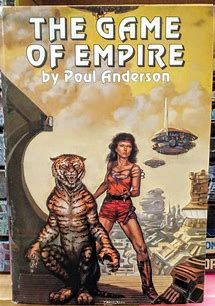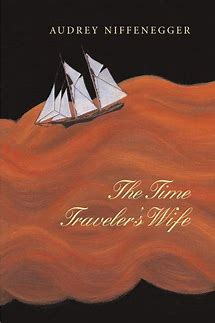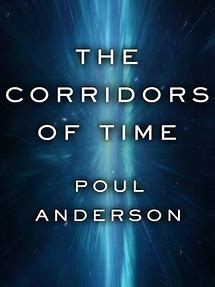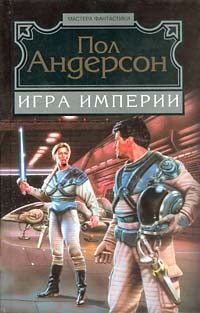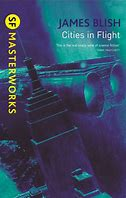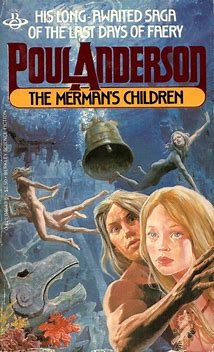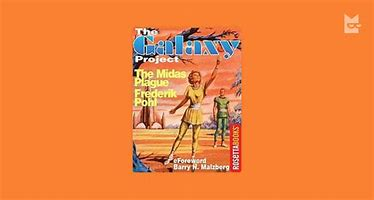In the Technic History, on Earth:
"Everywhere around towers soared heavenward in fluid grace; this quarter of the city went back two centuries, to when an inspired school of architecture had flourished. White clouds wandered through blue clarity; aircars sparkled in sunlight. A breeze brought coolness and a muted pulse of machines in the service of man."
Flandry in his roof garden sees white clouds and blue sky and feels a cool breeze so he is not completely enclosed or cut off from nature. His urban environment comprises high, graceful towers, aircars and machine sounds. Although it is all a thousand years in the future to us, it is two hundred years old to Flandry, living in his present.
In the Technic History, on Ramnu:
"Across a bridge, Dukeston reared and roared and glared."
-ibid., XI, p. 151.
This sentence conveys the dynamism of a city without, for once, delineating any details.
In The Corridors Of Time, Malcolm Lockridge sees Niyorek:
"Monstrous it gloomed on the shore, and inland further than his vision went. Maps and
diaglossa had told of an America webbed from end to end with megalopolis. Little broke that mass of concrete, steel, energy, ten billion slaves jammed together, save here and there a desert which had once been green countryside...
"North, south, and ahead, the city raised ramparts where nothing but a few wan lamps, and the spout from a hundred furnaces, relieved the lower murk. A sound came over the sea, humming, throbbing, sometimes shrilling so high it was pain to hear: the voice of the machines. On the upper levels, individual towers lifted a mile or more, the first dawn-glow pallid on their windowless sides. Cables, tubes, elevated ways meshed them together. The spectacle had a certain grandeur. They were not small-minded, the men who dreamed those vertical caverns into the sky. But the outlines were brutal, bespeaking a spirit whose highest wish was the unrestrained exercise of unlimited power, forever."
-Poul Anderson, The Corridors Of Time (Panther Books, St Albans, Herts, 1975), CHAPTER FIFTEEN, pp. 130-131.
Compared with Archopolis: higher and louder; not inspired but brutal.
After four million years of time travel, Martin Saunders stops in a city:
"...he couldn't follow the wild geometry of the titanic structures that loomed about him and they were never the same. The place throbbed and pulsed with incredible forces, it wavered and blurred in a strangely unreal light. Great devastating energies flashed and roared around him - lightning come to Earth. The air hissed and stung with their booming passage."
-Poul Anderson, "Flight to Forever" IN Anderson, Past Times (New York, 1984), pp. 207-288 AT CHAPTER SIX, p. 280.
Why does he think that this is a city? Not a voice but a thought warns him away.
"A billion years in the future there was a city standing on a plain where grass grew that was blue and glassy and tinkled with a high crystalline chiming as the wind blew through it. But the city had never been built by humans, and it warned him away with a voice he could not disobey."
-"Flight to Forever," p. 283.
After a billion years, it does not matter whether the non-human builders are our descendants or have evolved separately. This city is not described.














